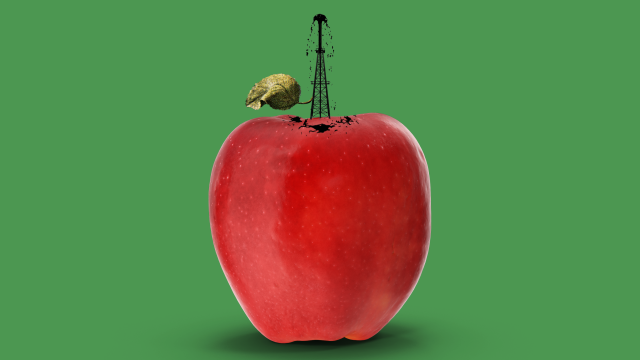On the ABCs of Big Oil, a new podcast miniseries from Earther and Drilled, climate journalist Amy Westervelt and I have spent two episodes looking into the oil and gas industry’s century-long assault on American education; how it has shaped school curricula to limit how Americans think about the climate crisis and how to take it on. On today’s episode, we look at their takeover of high school curricula. Take a listen — we promise we won’t give you a swirlie!
For decades, the fossil fuel industry has been funding educational materials in high schools that instill a very particular idea of conservation, which sees nature as a resource for humans to extract from as needed. Melissa Aronczyk, a media studies scholar at Rutgers University’s School of Communication, said this view has roots in teachings from a man named Gifford Pinchot.
Known as the Father of Forestry, Pinchot was the first chief of the Forest Service and served twice as the governor of Pennsylvania. He is celebrated in high school textbooks across the U.S. as an early conservationist because he advocated managing some parts of the country to conserve them for future generations But a closer look at his worldview reveals what he envisioned for the rest of the public lands under his purview.
In a 1910 text, Pinchot outlined his views that conservation “means also and first of all the recognition of the right of the present generation to the fullest necessary use of all the resources with which this country is so abundantly blessed. Conservation demands the welfare of this generation first, and afterward the welfare of the generations to follow.”
In 1921, Pinchot wrote that forest managers had “made progress” in terms of the public’s view of conservation. Why? Because “we hear less of the influence of the forest on climate and health, and more of the need for wood.”
This played out in Pinchot’s politics, too. Pinchot was reportedly once close with esteemed contemporary conservationist John Muir, but they had a falling out over a proposal to create a dam in California. Pinchot, unlike Muir, made compromises with logging and mining companies.
As Aronczyk explained in the episode, Pinchot took this message directly to school kids by writing high school textbooks. That means these messages have been forced onto American students since the early 1900s, and they’ve formed the foundation for the extractive industries’ pitch to students in the decades since.
We’ve seen how that’s played out. Extractive industry has time and time again pushed to open up pristine expanses for their own interests, destroying ecosystems that wildlife and people depend on while filling its pockets. But thanks to this history of propaganda, the fossil fuel industry has a good base to build on when convincing kids that that’s fine, actually — Indigenous people, ecosystems, and climate be damned.
The energy sector’s efforts in high schools smack of Pinchot’s ideas. Many of those endeavours have focused on economics, specifically on pushing the idea that all environmental decisions must factor in immediate costs to the economy. In episode two, Kert Davies of the Climate Investigations Centre, told me about his daughter being fed mining propaganda in elementary school.
“She said we did this really cool lesson today where the teacher gave us a chocolate chip cookie and a toothpick and we had to carefully extract the chocolate chips without breaking the cookie,” he said. “And the lesson was, you can do mining safely.”
Davies looked into the lesson plan and found that the American Coal Foundation and other coal interests. And the chocolate chip cookie lesson plan isn’t just used for elementary schoolers, either.
“There are even economics lessons where they put a price on the toothpick and a price on the reclamation. How much of a mess you make with the cookie [dictates] how much land you have to pay to reclaim, and you pay yourself for how many how many chocolate chips you get out of the cookie,” he said. It’s true, you can see these lesson plans all over the internet. They’ve been linked to the coal industry, too.
It’s not just coal, either. Oil and gas are deep in high school education, too. To take one example, the STEM Careers Coalition was launched in 2019 by the Discovery Channel’s educational arm. Discovery Education has a solid reputation among teachers for producing slick-looking, accessible materials. If you check out the site for this new project, it seems legit.
But if you look a little closer, things get weird. Check out the coalition’s “About Us” page, and you’ll see that oil and gas interests are listed as partners. Oil giant Chevron, the American Petroleum Institute, and power and energy distribution company AES are all giving them money. And so, it seems, is If/Then Philanthropies, which is listed as a “content partner.” That group was launched in 2018 by a woman named Lyda Hill, an heiress to an oil fortune amassed by tycoon H. L. Hunt. At one point, Hunt was the richest man in the nation thanks, in part, to the values Pinchot espoused about extraction. This isn’t Discovery’s only rodeo with oil and gas money, but it feels particularly gross to use those funds for materials for kids.
We’ve reached out to Discovery Education for comment and will update this piece if we hear back. We’d love to know more about this project. If you’re a teacher who has used Stem Careers Coalition materials in your classroom, get in touch with us. You can hit us up at tips@gizmodo.com or send a tip anonymously through Drilled’s SecureBox.
Amy Westervelt and Trevor Gowan contributed reporting for this piece.
